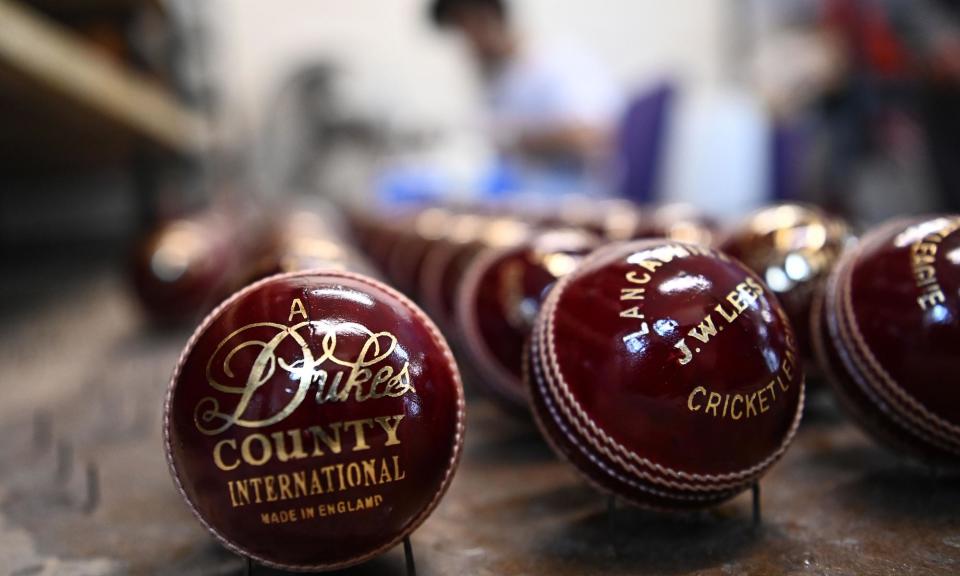‘We have a superior product’: Dukes maker invites Rob Key for talks over ball

The maker of Dukes balls has entered the debate on the trial use of the Kookaburra ball in county cricket and invited Rob Key, the England and Wales Cricket Board’s managing director of men’s cricket, to talk to him about the type of ball he wants to see.
Dilip Jajodia, the managing director of British Cricket Balls Ltd which has owned the Dukes imprint since 1987, was responding to a story in the Guardian this week in which Key hailed the trial use of the Kookaburra in the County Championship and called for it to be used permanently.
“I can’t speak for the inner thoughts of Rob Key,” said Jajodia. “He’s entitled to his opinions obviously. I’d be very happy to have a discussion with him about what he would like. If he wants a machine-made ball, we can absolutely do that.”
Related: County cricket talking points: draws dominate in another dreary week
In the first two rounds of the county season bowlers have used the machine-made Kookaburra instead of the usual handmade Dukes. With its slighter seam and propensity to go softer earlier, the Kookaburra provides less assistance to bowlers and has contributed to bat dominating ball.
“I think it’s been fantastic,” Key had said of the initial stages of the Kookaburra experiment, which was first proposed by Andrew Strauss’s high performance review in 2022 with a view to better prepare bowlers for the rigours of Test cricket overseas. “I would use the Kookaburra all the time. English cricket would be much better off for it.”
But Jajodia cautioned about any plans to expand the use of the Kookaburra. “You have to be careful about making snap decisions, the ECB will have to weigh up the pros and cons,” he said.
“We’ve seen with the white ball that it doesn’t really swing, so that craft goes out of the game. The Dukes red ball does swing and it often then reverse-swings. Bowlers like Jimmy Anderson can harness these skills. You have to be careful giving all that up to pursue success overseas.”
Dukes came under criticism in the seasons directly after the Covid-19 pandemic because their balls were deemed to be softer than usual and therefore going out of shape a lot quicker than they previously had. Stuart Broad went as far as to call the 2022 batch of Dukes balls “rubbish”, a quote that stung Jajodia and his small workforce at their factory in Walthamstow. The irony of softer balls now seemingly being desirable is not lost on him.
“We had a bit of trouble with our production processes during Covid and then had complaints that the balls were going soft and out of shape, now apparently the ball going soft is actually a virtue! It’s a bit confusing for us as the manufacturer.
“It’s not like bowlers don’t get chance to use the other [Kookaburra] ball – they dominate white ball cricket. The Kookaburra is almost universally used in white ball cricket.”
Jajodia stressed that no two cricket balls are the same – “No two cows are the same you see” – and that the process of making them by hand is a labour of love. “They are made from a natural, raw material. It is a skilled and artisanal process to make one by hand. You can only make about three or four in a whole day.
“I feel that our job is to produce a consistent product that plays well in all conditions and doesn’t overly favour bowler or batter. It’s about always trying to keep a balance.”
Jajodia said he is in touch with the ECB regularly and happy to discuss what could be required to take English cricket forward. “We’ll be here and we’ll keep working away, keep going,” he said.
“I think there’s no doubt that we have a superior product. I’ll issue the same challenge to anybody. You bring your ball at any price, anywhere, anytime, any test. I’m ready.”

